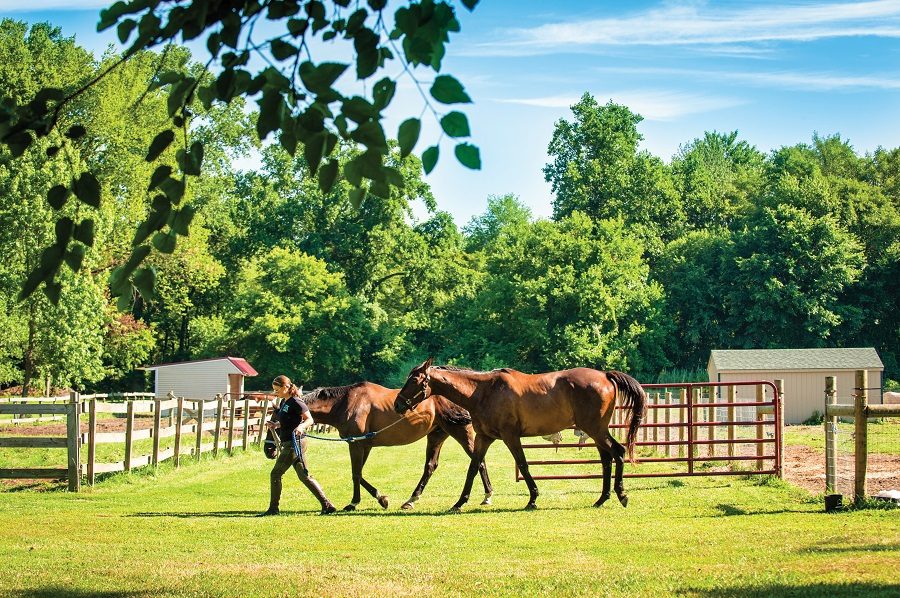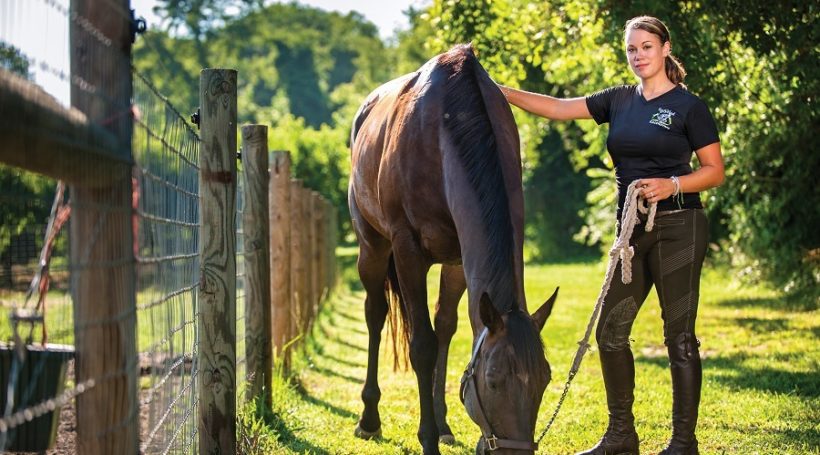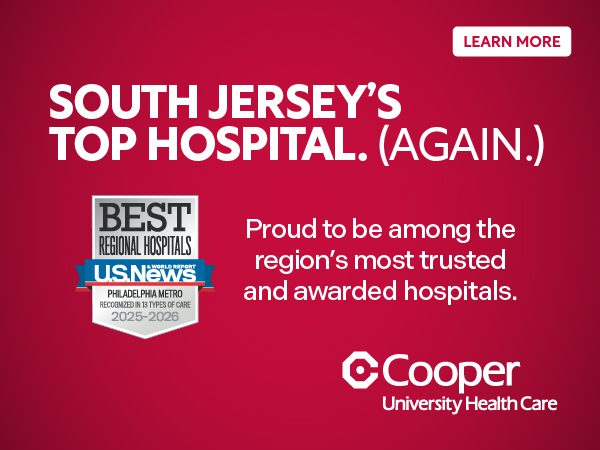Photography by David Michael Howarth
On a sunny day at Sewell’s Ivy Hill Farm, majestic thoroughbred horses graze on open fields, enjoying the breeze and the ability to gallop – or not – around the expansive acreage. These horses once worked as racehorses but are now too old or frail to continue in that sport, so they come to Ivy Hill to have a shot at a new life.
The farm is the home of Recycled Racehorses, founded and directed by Amanda McCleery, 32, to give horses a new purpose after the racetrack.
At any given time, there are between 12 and 20 horses on McCleery’s 25-acre farm. McCleery works in partnership with horse owners, charging them a monthly fee to feed, house and retrain the horses for a new career and then match them with a new owner. McCleery says she prefers not to call Recycled Racehorses a rescue.
“People hear that and think these horses aren’t worth anything anymore,” she explains. “But we’re transitioning them into new, sometimes very lucrative careers.”
Horses who end up at places like Ivy Hill or South Jersey Thoroughbred Rescue & Adoption – founded 10 years ago in Moorestown by Erin Hurley – are the lucky ones.

Recycled Racehorses founder and director Amanda McCleery
Hurley, 54, brings retired racehorses from the track to her farm, where they relax and recuperate before being retrained for second careers in show jumping, barrel racing, polo, leisure or trail riding. Then Hurley works to match each horse with an adopter.
“A lot of our horses come here directly from the race track,” Hurley says. “They need some time to chill out. When they’re at the racetrack, they’re in training, so they don’t ever get turned out into a field. They never leave their stall – they’re very protected. So they go from their 12×12 stall to the track, where they do their fitness work. They’re super tuned-up and fit, so they’re kind of climbing the walls.”
“Horses don’t do well in that kind of environment for long periods of time,” Hurley continues. “So they come to the farm, and there’s a period of adjustment where they really just learn to be horses again. They spend a lot of time out of the barn, out in the field. Compared to the track, farm life is pretty quiet.”
The reality for racehorses is bleak. They typically begin racing around 2 years old and retire around 4 or 5. An extremely fit horse that manages to avoid injury can race until 8 before it’s time to retire. But a horse’s lifespan averages closer to 30 years, and in many cases, the lives of thoroughbreds are cut short once their racing careers end. They are typically sold at auction, and the highest bidder is often who those in the industry call “the meat men.”
McCleery says the market for horse meat is a gruesome fact of equine life, but she’s doing her part to save young, capable animals from that fate.
“A lot of the horses go to the meat men, and they’re shipped to Canada or Mexico,” says McCleery. “It’s very normal in parts of those countries to eat horse meat. I understand that has to happen, but it’s difficult to see. It’s not just the auction – the meat men will go right to the racetrack. When you have these trainers who don’t have any money, the horses become numbers, and they have to pay the bills one way or another. I once asked a horse’s groom, ‘Oh, what’s his name?’ He said, ‘He’s number 17.’ It just broke my heart, because they have such personalities. It’s sad to think a 7-year-old horse who has run his heart out for his owners and gotten a bump or bruise is just written off. Most times that horse will go to the meat men.”
While the buyers of McCleery’s retrained horses are free to sell the horse again later, she requires them to sign a contract prohibiting the horse from ever going to auction. She wants to be sure they avoid the meat men forever.
“I once had an owner who resold a horse and then a few years later got a phone call saying the horse was being auctioned off,” she says. “He went right down and bought the horse back. It was lucky in that situation that the owner could go down and get the horse, but now we have a contract. It says you can be held accountable, and we will prosecute if we find one of our horses in an auction.”
Hurley’s nonprofit has an intense screening process for potential adopters, governed by the Thoroughbred Aftercare Alliance, which maintains a strict code of standards for accredited organizations.
“It was a huge accreditation process, and there are a lot of guidelines to adhere to,” Hurley says. “But that’s good, because they have very high standards. We do our homework about the new homes our horses are going to. Most of the time it’s all good; there are a lot of really great people out there who are looking to give horses a second chance.”
Most of the horses being retrained by both organizations are destined for another athletic career, but occasionally, McCleery says she comes across a horse that has the potential to do something even more special.
“We’ve had horses go to places where they do therapy for children with autism or children with muscular problems,” she says. “Sometimes you come across a horse who’s so quiet and gentle, maybe they aren’t capable of doing big show jumps, but they’re perfect for these therapy programs.”
Hurley, who recently returned to her day job as an occupational therapist, says she plans to start a training program for therapy horses when South Jersey Thoroughbred Rescue & Adoption moves to a larger facility in the near future.
“We’ve had some horses come to us who I think could make wonderful therapeutic horses,” she says. “It takes a very special kind of horse to do that, but I would love to train them to do that kind of work.”
While Hurley places as many as 100 horses a year with new families and owners, she says she’ll always want to do more to help. There are countless racetracks in the United States, all full of horses who will eventually need homes.
“The unwanted horse problem is huge in our country,” she says. “There’s never a shortage of horses. We’re just one small nonprofit, and we’re almost always in the red, but we’re doing our little part to help some of these incredible animals have a better life.”











